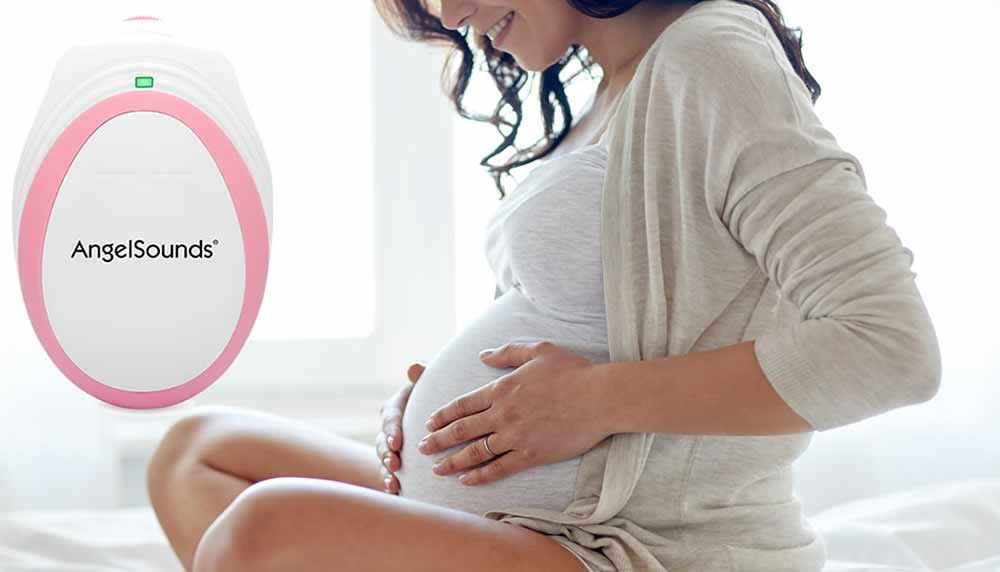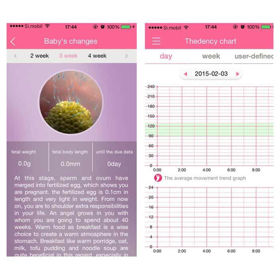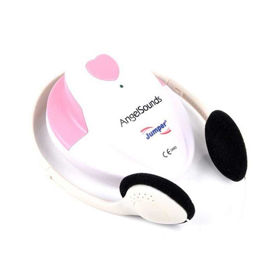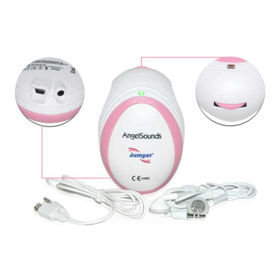AngelSounds Mini Baby Heartbeat Monitor is an innovative product and medical device designed to listen to the baby's heartbeat during the fetal period. The device works on the principle of the "Doppler" effect, whereby we can listen to the many sounds of the developing baby in the womb.
The product even allows you to record sounds that you can listen to over and over again
When is the Angelsounds hearing aid used?
It makes sense to start listening sometime in the third month of the fetus's age. At that time, you can hear the kicking of the baby, the faint sounds of the baby's heartbeat, and you can even hear the interesting hiccups of the baby. This is how you connect and you can hear the sounds of the unborn child and connect with him even before he is born.
When does your baby have a heartbeat?
By the 5th week of pregnancy, the set of cells that will become the baby's heart begins to develop and beat. If you have an ultrasound in the first trimester (around or after 6 weeks of pregnancy), your doctor or a trained sonographer will check for this fetal heart activity.

The ultrasound will also confirm your expected due date and how many children you are carrying. By the 17th to 20th week of pregnancy, your baby's heart chambers will be developed enough to be more clearly visible on an ultrasound.
When can you hear your baby's heartbeat?
You may first see (and/or hear) heart activity after 6 weeks of pregnancy or later if you have an ultrasound at one of your early antenatal appointments, although the time when it can be detected can vary slightly.
p>;
Can't hear your heartbeat yet? Do not worry. It probably just means that your shy baby is hiding in the corner of your womb or has his back facing outwards, making it harder to spot on an ultrasound.
At your next visit, your doctor will check that everything is fine. You will probably be able to hear some comforting sounds then. Later, at your 20-week ultrasound (also called a Level 2 ultrasound), you'll hear—and see—your baby's heartbeat.
Normal fetal heart rate
By week 6, the embryo's heart cells will beat about 110 times per minute. In just two weeks, the fetal heart system will contract at a rate of approximately 150 to 170 times per minute. That's about twice as fast as yours!
By week 9 or 10, the rate will be around 170 beats per minute - and will slow down from there. Around week 20, it will drop to around 140 beats per minute.
During labor, the typical fetal heart rate can range from 110 to 160 beats per minute, although there may be brief variations outside this range for various (often completely normal) reasons.
How does the development of the child's heart and circulatory system proceed?
The development of the embryonic heart begins early in pregnancy, and the child's being continues to change even after birth, as it adapts to the outside world from the womb.
Development in the first trimester
By week 4, a special group of cells is forming inside your embryo that will soon develop into your baby's heart and vascular (blood) system. During the 5th week, the preliminary structures that will become the baby's heart begin to beat spontaneously.
During these early stages, a baby's heart is like a tube that twists and divides to eventually form the heart and valves (which open and close to release blood from the heart to the body). Precursor blood vessels also begin to form in the embryo during the first few weeks.
Development in the second trimester
By the 17th week, the fetus's brain begins to regulate the heartbeat and prepares for life in the outside world. (Up to this point, the electrical activity of the heart occurred spontaneously.) Capillaries also form exponentially in the second trimester. These tiny blood vessels deliver oxygenated blood to the tissues in the baby's body and then recycle the deoxygenated blood back into the circulatory system.
Between weeks 17 and 20, the heart chambers have developed enough to be more visible on ultrasound. During the anatomical examination in the second trimester, the doctor will check the structure of the baby's heart and look for possible congenital heart defects.
If your doctor needs to better listen to and see your baby's heart, they may recommend a fetal echocardiogram between 18 and 24 weeks of pregnancy. Make sure you get it if you have a family history of congenital heart defects, or if you have diabetes, phenylketonuria, or an autoimmune disease.
Development in the third trimester
The baby's circulatory system will continue to grow slowly and steadily during the last trimester, so that by week 40 it will be ready for its first appearance outside the womb.
Interesting reading: Angelsounds - forum and opinions











 Facebook
Facebook
 Instagram
Instagram
 info@moja-lekarna.com
info@moja-lekarna.com

